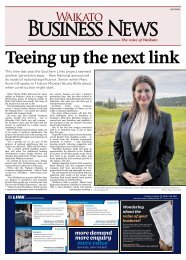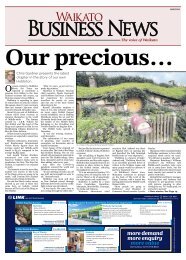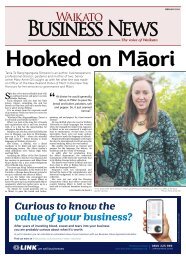Waikato Business News January/February 2017
Waikato Business News has for a quarter of a century been the voice of the region’s business community, a business community with a very real commitment to innovation and an ethos of co-operation.
Waikato Business News has for a quarter of a century been the
voice of the region’s business community, a business community
with a very real commitment to innovation and an ethos of
co-operation.
You also want an ePaper? Increase the reach of your titles
YUMPU automatically turns print PDFs into web optimized ePapers that Google loves.
WAIKATO BUSINESS NEWS <strong>January</strong>/<strong>February</strong> <strong>2017</strong> 17<br />
Addressing global tax avoidance<br />
With the world becoming increasingly<br />
globalised, perceived tax avoidance by<br />
international enterprises through multicountry<br />
business structures has been<br />
attracting increased media and public<br />
attention.<br />
There is widespread concern<br />
that multinational<br />
corporations have the<br />
ability to structure their businesses<br />
across different countries<br />
to minimise their overall<br />
tax cost, as a result of different<br />
tax regimes in individual<br />
countries.<br />
The Organisation for<br />
Economic Cooperation and<br />
Development (the OECD) has<br />
released a series of recommendations<br />
designed to close<br />
tax loopholes and make tax<br />
more equitable across the<br />
globe. Improvements to the<br />
world’s tax systems mainly<br />
focus on removing these deficits<br />
and increasing confidence<br />
in global markets. Estimates<br />
place the annual tax loss to<br />
governments across the world<br />
at between $100-$240 billion<br />
The New Zealand Government<br />
intends to adopt the full range<br />
of OECD recommendations<br />
to combat hybrid mismatch<br />
arrangements<br />
US dollars.<br />
Data released by the IRD<br />
shows that approximately half<br />
the entities registered in New<br />
Zealand with turnovers greater<br />
than $80 million are foreign<br />
owned, with a further 25 percent<br />
involved in international<br />
business operations.<br />
Due to the significance of<br />
these entities on our tax base,<br />
the New Zealand Government<br />
issued a discussion document<br />
earlier this year, seeking<br />
to adopt the majority of<br />
the OECD recommendations.<br />
The Government tax policy<br />
work programme for 2016/17<br />
includes a list of measures<br />
focused on ‘International Tax<br />
and Base Erosion and Profit<br />
Shifting (BEPS)’ of which one<br />
of the most complex issues is<br />
addressing ‘hybrid mismatch<br />
arrangements’.<br />
The ‘hybrid<br />
mismatch’ problem<br />
arises when<br />
multinational entities<br />
structure their<br />
business affairs to<br />
take advantage of<br />
different tax rules<br />
in different countries.<br />
A common<br />
example of this for<br />
businesses operating<br />
in both New<br />
Zealand and Australia is the<br />
use of loans structured as convertible<br />
notes.<br />
Under New Zealand tax<br />
law they are treated as debt<br />
instruments, with interest payments<br />
being tax deductible.<br />
Under Australian rules<br />
they are treated as an equity<br />
instrument – so the ‘interest’<br />
payments are treated as<br />
dividends with the benefit of<br />
tax credits, which results in<br />
no tax to pay on the income.<br />
This can result in a mismatch:<br />
the NZ Company receives a<br />
tax deduction in New Zealand<br />
with no corresponding taxable<br />
income in the Australian<br />
Company.<br />
A further example is the<br />
situation where a US parent<br />
company has a 100 percent<br />
owned NZ subsidiary. Under<br />
New Zealand tax rules, any<br />
payments made to the US<br />
parent can be tax deductible,<br />
however under US domestic<br />
law the receipt of this income<br />
can be treated as non-taxable.<br />
Again, this results in a mismatch:<br />
there is a tax deduction<br />
in New Zealand with no<br />
corresponding taxable income<br />
in the US.<br />
The New Zealand<br />
Government intends to adopt<br />
the full range of OECD recommendations<br />
to combat<br />
hybrid mismatch arrangements.<br />
The proposed changes<br />
are complex, however<br />
they aren’t just relevant for<br />
global giants; the rules will<br />
need to be understood by all<br />
New Zealand businesses that<br />
engage in cross-border transactions,<br />
even relatively small<br />
NZ companies doing business<br />
New vet practice reflects<br />
Pokeno’s growth<br />
Pokeno’s fast-growing population<br />
now has another<br />
reason to call the area<br />
home – the recent opening of the<br />
town’s first veterinary surgery.<br />
CareVets Pokeno Ltd opened<br />
for business little more than a<br />
month ago, and newly-installed<br />
veterinarian Emma Hill says the<br />
response from the community<br />
so far has been “really positive”.<br />
“We’ve been out and about<br />
letting people know that we are<br />
open for business … everyone<br />
seems really pleased to have a<br />
vet right here. It’s seen as a real<br />
plus for an area that is growing<br />
this fast,” she said a week before<br />
Christmas.<br />
Heading the move to open<br />
the Pokeno clinic was CareVets<br />
director Keith Houston, a veterinarian<br />
with more than three<br />
decades’ experience and the<br />
man who started and funded the<br />
national CareVets group more<br />
than 15 years ago, principally to<br />
make high quality pet care more<br />
accessible to communities.<br />
Dr Houston said the new<br />
surgery staff would work closely<br />
with veterinarians at The<br />
Vet Centre Pukekohe, The Vet<br />
Centre Waiuku, and Byerley<br />
Park horse centre near Karaka,<br />
allowing Pokeno’s animal-owners<br />
to tap into an impressive network<br />
of knowledge and skills.<br />
“The new clinic has been<br />
established to act as an extension<br />
of our services to the entire<br />
area,” he explained. “The housing<br />
growth in Pokeno has been<br />
the impetus to provide a local<br />
pet service, as well as our rural<br />
veterinary servicing of dairy,<br />
equine and small block holders.<br />
Our team members enjoy sharing<br />
their knowledge and supporting<br />
each other.”<br />
The <strong>Waikato</strong> District Council<br />
has developed a structure plan to<br />
help manage Pokeno’s unprecedented<br />
growth, and to support<br />
its increasing population<br />
through the provision of appropriate<br />
amenities and services.<br />
Council statistics already show<br />
a rapid increase in the number<br />
of registered dogs in the area,<br />
with some 360 more dogs registered<br />
during 2016 than in 2013.<br />
Similar increases are likely in<br />
number of other pets and lifestyle<br />
animals.<br />
Having local veterinary skills<br />
close to hand is being viewed as<br />
an important step in providing<br />
for that growing population.<br />
CareVets Pokeno veterinarian<br />
Dr Hill brings six years of<br />
widespread experience to the<br />
role, working most recently<br />
out of the Waiuku Veterinary<br />
Surgery.<br />
“Much of the work I did in<br />
my first three years as a vet was<br />
with small animals,” she said.<br />
“Since then, I have added in a<br />
mix of equine and farm animals,<br />
in Australia.<br />
Some of the key changes<br />
proposed to be implemented<br />
in New Zealand include:<br />
• Denial of a tax deduction<br />
for a payment to an overseas<br />
related entity, where<br />
the payment is not treated<br />
as taxable income.<br />
• Where foreign dividends<br />
received by a New Zealand<br />
company would normally<br />
be non-taxable, they will<br />
become taxable if there has<br />
been a tax deduction in the<br />
overseas company.<br />
On a practical level, this is<br />
most likely to affect:<br />
• New Zealand businesses<br />
with loan or share arrangements<br />
with businesses in<br />
other countries;<br />
• New Zealand branches of<br />
foreign companies, or NZ<br />
companies with overseas<br />
branches;<br />
• New Zealand companies,<br />
partnerships and trusts<br />
with overseas owners or<br />
investors, or with foreign<br />
investments.<br />
Due to the global nature of<br />
these arrangements, the New<br />
Zealand Government recognises<br />
that our domestic policies<br />
can only be effective if<br />
the OECD recommendations<br />
which means I am very familiar<br />
with animals of all sizes – pretty<br />
much ready for anything.<br />
“The local clinic is equipped<br />
to handle standard veterinary<br />
TAXATION AND THE LAW<br />
> BY HAYDEN FARROW<br />
Hayden Farrow is a PwC Executive Director based in the<br />
<strong>Waikato</strong> office. Email: hayden.d.farrow@nz.pwc.com<br />
are implemented worldwide.<br />
The Government is therefore<br />
closely following the changes<br />
adopted by the UK, EU<br />
and Australia before the new<br />
rules are passed into legislation<br />
here. However the US<br />
and some Asian countries are<br />
currently reluctant to adopt<br />
the OECD recommendations,<br />
so it will be interesting to see<br />
how the international markets<br />
react.<br />
In addition to addressing<br />
hybrid mismatch arrangements,<br />
other measures aimed<br />
at improving global tax standards<br />
include an increased<br />
focus on transfer pricing and<br />
the robustness of double tax<br />
agreements.<br />
Transfer pricing rules have<br />
been on the agenda for many<br />
years; they seek to ensure that<br />
where goods and services are<br />
sold between related parties of<br />
a larger enterprise, those sales<br />
take place at a fair value, so<br />
that an appropriate amount<br />
of revenue is recorded in the<br />
correct entity. Although these<br />
rules have been in place for<br />
some time, the increased focus<br />
on international arrangements<br />
means that IRD is likely to<br />
monitor such arrangements<br />
closely, so it is important<br />
CareVets Pokeno veterinarian Emma Hill, left, with<br />
vet nurse and clinic receptionist, Jacqui Langley.<br />
consultations and minor surgery<br />
such as de-sexing and the like.<br />
Anything more complicated<br />
than minor surgery would be<br />
done in Pukekohe, which is just<br />
that New Zealand businesses<br />
ensure their transfer pricing<br />
arrangements are fit for purpose.<br />
The Government is also<br />
working closely with the<br />
OECD and current treaty<br />
partners to ensure international<br />
agreements remain fit for<br />
purpose. The double tax treaties<br />
with China and Korea are<br />
currently being re-negotiated;<br />
as key trade partners any New<br />
Zealand businesses operating<br />
in these countries will need<br />
to keep a close eye on resulting<br />
changes that could impact<br />
existing contracts.<br />
The proposed changes are<br />
not simple. Recommendations<br />
that result in legislative<br />
change will need to be comprehensively<br />
understood by<br />
affected entities. Compliance<br />
with these intricate changes<br />
will have the potential to<br />
cause major headaches for<br />
New Zealand business looking<br />
to overcome the technical<br />
and practical difficulties of<br />
business on the international<br />
stage.<br />
The comments in this article<br />
of a general nature and<br />
should not be relied on for<br />
specific cases. Taxpayers<br />
should seek specific advice.<br />
15 minutes away.”<br />
Dr Hill will be supported at<br />
CareVets Pokeno by a veterinary<br />
nurse Jacqui Langley, who will<br />
also take care of front of office.<br />
New appointment to oversee TGH and Tainui relationship<br />
Tainui Group Holdings<br />
(TGH) has announced<br />
the appointment of<br />
Pierre Tohe to the role of general<br />
manager engagement.<br />
TGH chief executive Chris<br />
Joblin says Mr Tohe, who is<br />
of <strong>Waikato</strong>-Tainui descent, is<br />
a proven leader in Maori business.<br />
“Pierre’s tribal affiliations,<br />
years of experience as head<br />
of Maori business at BNZ and<br />
his legal background, will help<br />
us stay joined at the hip with<br />
<strong>Waikato</strong>-Tainui and will open<br />
up the opportunity to explore<br />
investment partnerships at the<br />
hapu, marae and incorporation<br />
level,” Mr Joblin says.<br />
“Pierre’s appointment<br />
is in line with our strategy<br />
to appoint and develop tribal<br />
members within key roles<br />
in TGH where they have the<br />
skills and qualifications to<br />
advance the commercial, cultural<br />
and social outcomes of<br />
the wider tribe. His knowledge<br />
of tikanga will ensure we<br />
continue to work in culturally<br />
appropriate ways in line with<br />
the values and aspirations of<br />
<strong>Waikato</strong>-Tainui,” Mr Joblin<br />
says.<br />
Pierre was born in Huntly<br />
and is currently a trustee<br />
at Taniwha marae with<br />
family links to Waahi and<br />
Kaitumutumu marae.<br />
He has been the Aucklandbased<br />
head of Maori business<br />
for BNZ since August<br />
2011, following earlier roles<br />
as in-house legal counsel<br />
and senior solicitor for the<br />
BNZ since 2003. Earlier in<br />
his career Pierre also worked<br />
at leading law firm Buddle<br />
Findlay as a solicitor for five<br />
years after graduating from the<br />
University of Auckland with<br />
a Masters of Laws (LLM) in<br />
1998.<br />
Pierre says he is excited<br />
about the prospect of putting<br />
his experience to work for his<br />
own iwi.<br />
“Over the past five years, I<br />
have seen the difference made<br />
by effective iwi investment<br />
strategies. <strong>Waikato</strong>-Tainui<br />
and TGH have made a great<br />
start as pioneers of economic<br />
development since the 1995<br />
settlement, and I’m excited to<br />
put my shoulder to the wheel.<br />
I have always had a vision to<br />
return and work for <strong>Waikato</strong>-<br />
Tainui and believe we will<br />
unlock great things by working<br />
as one across the tribe,”<br />
he says.<br />
Pierre will start with TGH<br />
in early <strong>February</strong>.<br />
Tainui Group Holdings<br />
new general manager<br />
engagement Pierre Tohe.


















